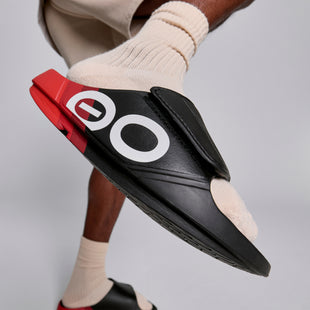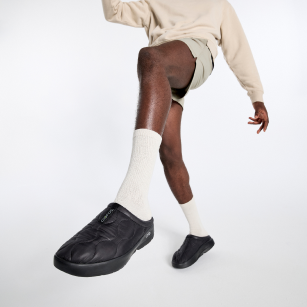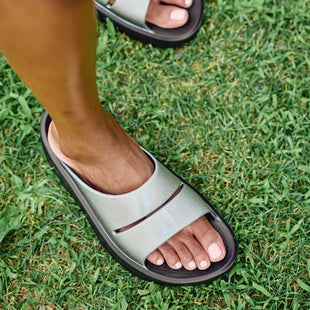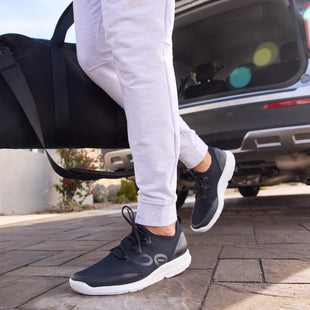

Now this certainly isn’t something I would advise, but I wanted to give both of these events a go, and I knew I was fit enough to take on this challenge. Luckily for me, my A race was London Triathlon which came first, whilst I was treating Ride London as an enjoyable day of cycling with no time goals. I trained for both and practiced my recovery strategy. I’ve found that recovery is a trial and error process, but once you nail what works for you, you can really optimise the process, treat your body well and get back to doing what you love. So, here are my tips for how I approach recovery, especially after a big event.
Be on it with your post-race recovery
For me recovery starts the minute I stop. As soon as I’m over the finish line I begin my recovery process and I think it’s important to have a tried and tested plan. No matter how tired I am I keep moving, even if it’s just baby steps. I sip water, enjoy the finish line euphoria and start making my way to my bag. I use Science in Sport rego, get my OOfos on and then begin very gentle stretching/ mobilising. One piece of kit I love after a race is my MyoMaster MyoPro I use it on a low/light setting and gently begin to flush my legs out. It is perfect for when you’re too tired to extensively stretch or too sore to foam roll. Then I start thinking about food. I won’t beat around the bush pretending I eat healthy after a big race, my go to is a cheeseburger and it always hits the spot! Having a post-race plan that you can do on autopilot after a big effort is really useful, especially for when you’re tired and just don’t want to have to think about what you’re doing.
Pamper yourself
After marathons and running events I find my feet can be a bit battered. I use my OOfos to give me that much needed ‘OOfoam’ cushioning and also treat myself to a pedicure. I think this combination is how I’ve managed to keep all my toenails. The day after a big race I treat myself to a bubble bath and lots of lotions and potions. A little bit of ‘me’ time works wonders!
Don’t underestimate the power of sleep
I always aim to get around 8 hours sleep a night, and before/ after big events I try my best to increase this. As I begin to rest ahead of a big event, my training duration reduces so I have more time back in an evening which means I can get to bed slightly earlier. Even just 30 minutes can make all the difference. A recent article published in The International Journal of Sports Medicine outlines that extending your period of sleep can positively affect reaction times, your mood, sprint power and agility, accuracy, swim turns and kick stroke efficiency (Vitale et al,2019). Extending your sleep prior to a sporting event is known as ‘banking sleep’ and can positively help improve your performance and recovery.
Eating well
I’m no nutrition expert, but I do my best to eat a healthy and balanced diet. I’m really lucky to have a super clued up friend to openly talk about all things food and nutrition with. Livvy, aka @thenutritiousrunner is a nutrition and dietetics student and keen runner. Here is some of her excellent advice: “Nutrition isn't just key in the lead up to an event but plays a vital role in recovery too. It doesn't need to be complicated; by remembering the 3 R's you can ensure you optimise your recovery. Refuel (consume a combination of carbs and protein, with the focus being on the carbs to replenish your glycogen stores) Rebuild (for long term recovery and muscle repair, protein is key) Rehydrate (one that tends to be forgotten... Replace your lost fluids with water and/or electrolytes). These steps need to be followed post training sessions to prepare you for your next session or race, and of course post-race to fully recover.”
Adapting your training and being realistic
One thing I love about triathlon training is being able to balance running, cycling and swimming. In the week between London Triathlon and Ride London I reduced and adjusted my training load to incorporate both recovery after the first event and rest before the second. After London Triathlon I rested all day Monday then went for a gentle swim Tuesday evening followed by a stretching/ rehab session. I find that swimming is a fantastic low impact way to recover and the cold water seems to ease any muscle soreness. On the Wednesday I did a gentle 30 minutes on the Watt Bike, then on the Thursday I swam again followed by some more gentle stretching and rehab. I rested Friday and Saturday. The most important thing after any race is to listen to your body and not rush back to too much exercise too soon. My golden rule is, if you’re questioning whether you’re ready to exercise after a big event then you probably should rest longer, one day extra will always do more good than harm.
Get professional help if you need it
There is only so much we can do on our own and the help from qualified professionals is invaluable. Sports massage is a great way to boost your circulation and help flush the muscles. For any niggles see a sports therapist/ physiotherapist. It is also important to be open and honest with any physio regarding your training and goals and listen to their advice (even if you don’t want to) as they certainly know best! In the lead up to your big race try a few different physios/ therapists and find one that works for you and your training, having a relationship with a professional you trust comes in handy when you need them most. My physio Lewis (Fit2Function clinics Covent Garden) knows all about my training, my injury history and what my treatments work for me
Be kind to yourself
Not everyone bounces back, and just because you might recover well 99% of the time there is always that 1% where you might need longer. Always keep listening to your body and take it day by day.







